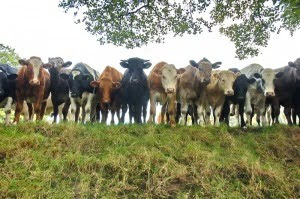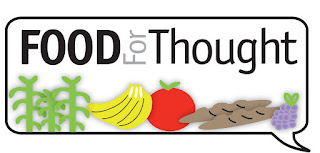The Lowdown

"Research from Harvard suggests that the high level of estrogen in the milk from a cow is correlated to an increased risk of hormone-related cancers such as ovarian, prostate, testicular and breast cancer.
The Journal of the American Dietetic Association has published a report saying that as many as 75 percent of the world’s population loses the ability to digest lactose, a sugar found in milk, after infancy."
The Lowdown
By Vasu Murti
Man is the only species that drinks the milk of another species. All other species drink the milk of the mothers of their own species until they are weaned. Cow's milk is the perfect food—if you're a baby calf!
To mass produce cow's milk on a large scale via factory farming, cows have to be kept continually pregnant, giving birth, and lactating.
The cows are genetically bred to produce excess cow's milk for humans. Male cows (bulls) are useless to the dairy industry, so they become veal. By supporting the dairy industry, one indirectly supports cow killing.
In a posting entitled "humane dairy??" appearing on AlterNet on August 22, 2009:
"Of course it is impossible to source any 'humane cheese' or dairy. In order to be economically viable, the females must be kept constantly impregnated. This is a traumatic and painful procedure. The industry calls the restraining mechanism 'the rape rack'. The cow also endures pain at birth as any animal does. Her calf is separated from her at only a few days/hours old. This causes immense distress as the milk was intended for her baby. Her baby depending on sex is either female and placed within the herd or sent to slaughter immediately with undesirable male calves. The 'lucky' male calves get to spend a few months in a dark box, fed an anemic diet, then sent to slaughter. There is absolutely no way that 'humane dairy' can ever exist. www.humanemyth.org "
Back in 1987, I argued for vegetarianism. Someone claimed humans are omnivores, saying we've been hunting since the days of the caveman, etc. I responded by quoting the anatomical comparisons found in The Higher Taste (the original 1983 edition) claiming humans are herbivores. I no longer make the argument that humans are herbivores. Rather, I argue we resemble the other primates- frugivores. We're designed to live predominately, if not entirely, upon plant foods. Yet everywhere I go, I encounter meat-eaters. People are creatures of habits, often imprisoned by them.
Can children be raised without cow's milk? Yes! 75% of the world's population (blacks and Asians in particular) are lactose intolerant, and can't digest milk after infancy. Dr. Michael Klaper has written books on vegan nutrition, pregnancy, and childbirth.
Vegetarians do cause far less cruelty than meat-eaters, but a nonviolent philosophy would carry greater weight from vegans.
One of the first books I read on the subject of vegetarianism while in college was A Vegetarian Sourcebook by Keith Akers (1983).
It describes the environmental damage caused by raising animals for food: topsoil erosion, deforestization, loss of groundwater, etc. as well as the economic inefficiency and waste of energy and resources in raising animals for food in an age of exploding human population growth. Keith Akers foreshadowed John Robbins' Diet for a New America.
In A Vegetarian Sourcebook, Keith Akers writes:
"Using grasslands for livestock agriculture creates great environmental problems, which greatly limits its usefulness. Grazing systems require ten times more land than feedlot agriculture, in which animals are simply given feed grown on cropland. Grazing systems have to be extensive in order to avoid the catastrophic consequences of overgrazing—which renders a piece of land unsuitable for any purpose.
Overgrazing and the consequent soil erosion are extremely serious problems worldwide. By the most conservative estimates, 60% of all U.S. rangelands are overgrazed, with billions of tons of soil lost each year. Overgrazing has also been the greatest cause of man-made deserts."
This mockery and hypocrisy in human society brings about unlimited calamities. According to the editors of World Watch, July/August 2004: "The human appetite for animal flesh is a driving force behind virtually every major category of environmental damage now threatening the human future--deforestization, topsoil erosion, fresh water scarcity, air and water pollution, climate change, biodiversity loss, social injustice, the destabilization of communities and the spread of disease."
Brother David Steindl-Rast, a Benedictine monk, similarly writes in the February 1995 issue of Harmony: Voices for a Just Future:
"The survival of our planet depends on our sense of belonging- to all other humans, to dolphins caught in dragnets, to pigs, chickens and calves raised in animal concentration camps, to redwoods and rainforests, to kelp beds in our oceans, and to the ozone layer."

